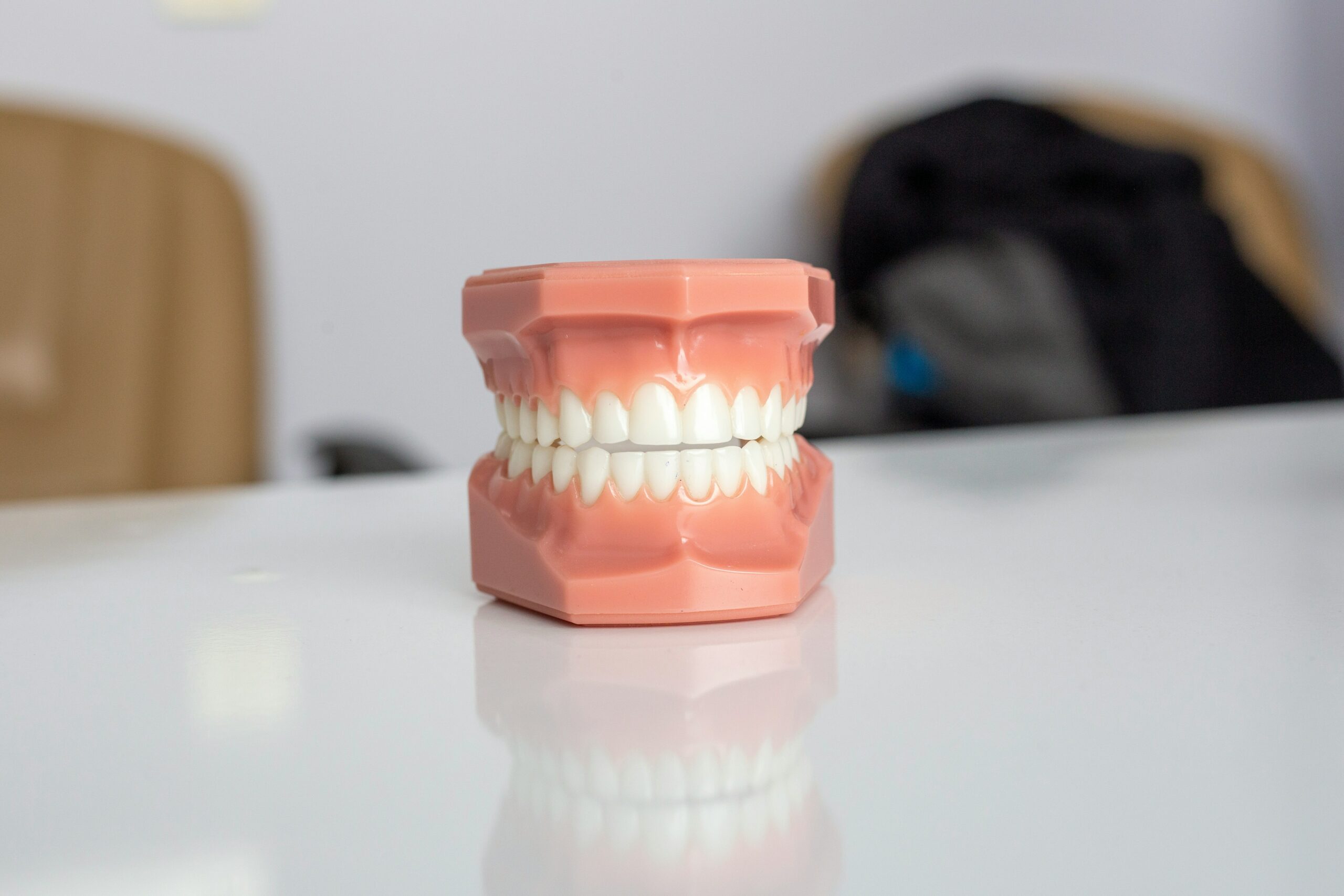
Mind Your Mouth: Huntington’s Disease and Oral Health
A recently published review discusses the challenges of dental care for people with HD, and the ways that informed dentists and medical teams can help to manage oral healthcare throughout the HD journey.

Seeking dental care and adhering to recommended routines is tough for lots of folks, even under the best of circumstances. Throw Huntington’s disease (HD) into the mix, and oral health can get even tougher. A recently published review paper in the journal Special Care in Dentistry covers some of the challenges faced by HD families with keeping our chompers healthy. It also discusses research into oral health in HD, and recommends strategies for dental professionals caring for people with HD. When specialists care enough to prepare and publish a formal article about improving quality of life through oral health for people with HD, we think that’s worth mouthing off about!

Barriers to Dental Care
The authors of this paper, Dr. Hanad Duble and Dr. Aviv Ouanounou, describe HD for their readers (dentists) who are unfamiliar with the disease, and outline common barriers to accessing dental care for people with HD. Some of these may seem obvious to the HDBuzz readers – those who are affected by HD, live with someone who is symptomatic, or are tuned into HD research. Here are some of the main barriers the authors identify:
- Fear: A lot of folks dread the dentist, and that anxiety can be exacerbated for people with HD. Shame and stigma can compound this as well.
- Finances: HD can create a financial strain for many reasons, including job loss and accompanying lack of insurance, and it can be hard to financially prioritize dental care.
- Mobility and motivation: Behavioral symptoms and movement challenges can make it difficult to get to a dental office, keep appointments, or maintain a routine at home.
- Oral changes: Involuntary movement (chorea), stiffness, or muscle weakness make it more challenging for dentists to examine, clean, and operate on the mouth.
- Lack of training: Many dental professionals don’t have experience working with people with HD (this article is a step towards providing guidelines!)
There may be other barriers to proper oral care for individuals from HD families – no one experiences HD in the same way. The vast majority of dentists are unlikely to see more than a few HD patients over a lifetime of practice, so it’s encouraging when knowledgeable professionals write about the challenges of HD for their peers.
Seeking dental care and adhering to recommended routines is tough for lots of folks, even under the best of circumstances. Throw Huntington’s disease (HD) into the mix, and oral health can get even tougher.
Common Oral Health Challenges
The authors also lay out common oral challenges for people with HD and how they affect dental care. They drew from their own practice as well as from the scientific literature, including clinical studies, case reports, and past reviews. It’s a lot to sink your teeth into, but important to know what might arise as symptoms progress.
Cavities (caries) and gum disease:
- Chorea: movements of the body, face, and tongue can make it more difficult for a person with HD or their companion to brush and floss, and dentists may have trouble using specialized tools or finding safe and comfortable positions.
- Diet: a person’s eating habits might change to accommodate chorea, difficulty with chewing and swallowing, or weight loss. Softer foods, liquids, higher frequency of meals, and foods with more sugar and carbs can affect tooth and mouth health.
- Dysphagia: the medical term for difficulty swallowing, which is very common in HD. This can mean that more food gets stuck in the teeth, mouth, and throat.
- Mood and motivation: symptoms like apathy and depression can make it more difficult to prioritize oral care at home or make dental appointments.
Medication challenges
- Side effects: some of the drugs used to manage HD symptoms, like antidepressants and mood stabilizers, can cause dry mouth, drooling, or increase the risk of mouth infections. Other medications can cause increased likelihood of fainting or dizziness, which is important for a dentist or hygienist to be aware of when using a reclining chair or choosing anesthetics.
- Drug-drug interactions: some medications prescribed to treat dental pain, anxiety, and infections can interact negatively with common treatments for HD.
- Anesthesia: general anesthesia can lead to complications, especially with chronic disease, so specialists may choose sedation over “putting someone under.”
Dysarthria (difficulty speaking)
- Home care and appointments: also known as dysarthria, when someone has a hard time communicating, it can be difficult to let a loved one or dentist know what is causing them pain or discomfort on a daily basis or during an appointment.
- Placement of devices or prosthetics: muscle weakness in the face and tongue that causes difficulty with speech can also make it difficult to keep safety devices or prosthetics (false teeth) in place.
- Consent: some people might want to request or deny aspects of routine care or invasive procedures, and communication challenges can make these discussions slower or impossible.

amirhosein esmaeili
Strategies for dental care
This paper provides recommendations for dentists who are treating people with HD, based on a thorough understanding of published evidence, as well as the authors’ years of collective experience in this field. It may be helpful for families to “brush up” on what special precautions, procedures, and work-arounds are available.
- Compassion and presence (duh!): the authors urge dentists not to discriminate against HD patients, and they note that a good rapport, emotional support, and care partner involvement can be especially helpful to ease anxiety and motivate a routine.
- Planning for dental care: making a longer-term plan for dental care early on can be helpful to discuss concerns and wishes around diet, role of a care partner, and how to approach daily care or procedures when communication becomes more difficult.
- Extra prevention:
- The paper recommends that dentists assign an oral hygiene plan and emphasize caregiver involvement and education.
- Dentists might consider fluoride or varnish treatments for adults, though they are normally given to kids.
- Consuming products with xylitol (a sugar substitute in some types of candy, mouthwash, and toothpaste) can be good for teeth
- Mouthguards can relieve grinding pressure due to chorea.
- More frequent visits (every 3 or 6 months) if possible may help to keep teeth healthier and adjust care plans as needed.
- Comfort and safety:
- If a person is taking medications that cause a sudden drop in blood pressure when sitting or standing, the authors recommend avoiding reclining the dental chair past 45 degrees, and not sitting them up too fast.
- Pain control: choosing acetaminophen (paracetamol) over ibuprofen is safer for those taking SSRIs.
- Dentists can consider using medications that keep the patient awake but relaxed to minimize pain or control chorea for long appointments or procedures.
- Dental offices might have (or may be able to order) special chairs, restraints, biting devices, or pillows that help to keep someone comfortable and stable and their mouth positioned safely during an exam, cleaning, or procedure.
- Less invasive care:
- Brushing/flossing alternatives exist to make care easier, like water flossers, floss picks, or different types of brushes.
- Preventing damage: if someone with HD has many small cavities that might require a lot of fillings, the authors recommend that dentists consider painting teeth with Silver Diamine Fluoride, which can kill bacteria and stop existing cavities from worsening.
- Filling material: there are different substances that dentists use to fill cavities. One recommendation in this paper for treating people with HD is the use of a filling made of Glass Ionomer (GI). This is often used on baby teeth, or as a temporary solution in adults. It doesn’t last many decades the way a metal or composite filling can, but it is easier to apply and releases fluoride.
Extra care and planning early on can help delay the need for tough conversations and complex procedures later.
Lots to chew on
First and foremost, the existence of this publication is encouraging. It’s a new reference that consolidates information and practical advice, with the goal of helping professionals better understand HD-specialized dentistry. However, we are not presenting medical advice! Please consult with your own dentist before embarking on any new oral health regimen. The more info they have about other aspects of your health and medical history, the better individualized care they can provide.
That said, the authors of this paper stress prevention and early communication. Extra care and planning early on can help delay the need for tough conversations and complex procedures later. They recommend that dentists caring for people with HD consult with each patient’s neurologist, understand the side effects of common HD medications, and provide comfort measures and plans tailored to the individual. You may be able to help jump-start those important conversations and connections.
Above all, we encourage each member of every HD family to take care of their pearly whites and to advocate for their needs – healthier mouths make for louder voices!
Learn More
Original research article, “Huntington’s Disease and Dentistry: A Review of Its Etiology, Clinical Presentation, Symptomatic Pharmacotherapy, and Dental Management” (open access).
For more information about our disclosure policy see our FAQ…


